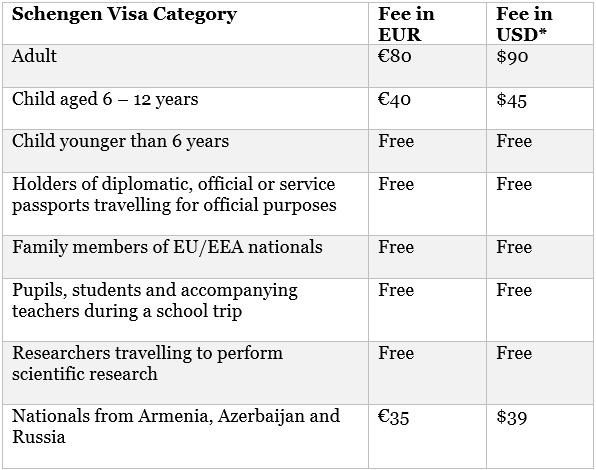How much does a Schengen visa cost?
Currently, there is a list of 107 non-EU countries whose citizens require a visa if they wish to travel to the EU. Each year, millions of tourists and business trippers from these countries are able to travel freely across multiple European countries on a single permit, by applying for a Schengen visa.
The Schengen area comprises 26 European countries that have officially abolished all passport and other forms of border control at their mutual borders. The 26 countries that make up the Schengen zone are: Austria, Belgium, Czech Republic, Denmark, Estonia, Finland, France, Germany, Greece, Hungary, Iceland, Italy, Latvia, Liechtenstein, Lithuania, Luxembourg, Malta, Netherlands, Norway, Poland, Portugal, Slovakia, Slovenia, Spain, Sweden, and Switzerland.
A Schengen visa is a short stay visa which allows its holder to enter, freely travel within and leave the Schengen zone from any of the 26 Schengen member countries. It is valid for stays of up to 90 days for tourism or business purposes.
Before applying for a Schengen visa, candidates should ensure they are fully aware of the eligibility requirements and the application process. Over the previous weeks, Smith Stone Walters has published a series of articles addressing some frequently asked questions on Schengen visas, including which type to apply for, what travel insurance is required, and common mistakes to avoid when submitting an application.
In this article, we answer one of the most common questions asked by applicants: how much does a Schengen visa cost?
Schengen visa fees explained
The cost of a Schengen visa varies based on a number of factors, including which visa type you are applying for, the duration of its validity, and the applicant’s age and nationality.
The below table sets out the applicable fees for each category:

* The applicable visa fee in USD (US Dollar) is as per the current exchange rate. It is subject to change without notice.
These fees are static and unchangeable until the Schengen members decide otherwise. For the most up to date list of fees, please check here.
The applicable visa fee can be paid in local currency at the designated consulate or embassy in which you are applying via cash, debit or credit card. However, some consulates may not allow you to pay by credit card. In the event the Schengen visa is denied there is no refund of the application fees paid.
Who does not need to pay for a Schengen visa?
In some cases, you may not be required to pay a fee when applying for a Schengen visa. For applicants belonging to one of the following groups, the visa fee is waived:
- Children under six years
- School pupils, students, postgraduate students and accompanying teachers who undertake stays for the purpose of study or educational training
- Researchers from third countries travelling for the purpose of carrying out scientific research
- Representatives of non-profit organisations aged 25 years or less participating in seminars, conferences, sports, cultural or educational events organised by non-profit organisations
- Family members of EU/EEA citizens, falling under Directive 2004/38
Citizens of: Albania, Bosnia and Herzegovina, Georgia, Moldova, Montenegro, North Macedonia, Serbia and Ukraine holders of biometric passports do not require Schengen visa.
Help with your Schengen application
If you require support in filing a Schengen application and compiling the necessary supporting documentation, Smith Stone Walters can help. We also offer a bespoke, twinned service for Skilled Worker and Schengen applications, which is growing in popularity with our clients.
By partnering with us, we will work with you to ensure both your Skilled Worker and Schengen applications are prepared for your overseas employees simultaneously, securing a fast-tracked decision to provide your business with the fastest and most effective delivery possible.
To find out more, please contact our team today.










